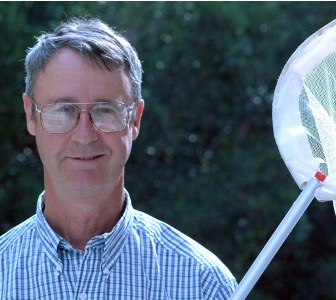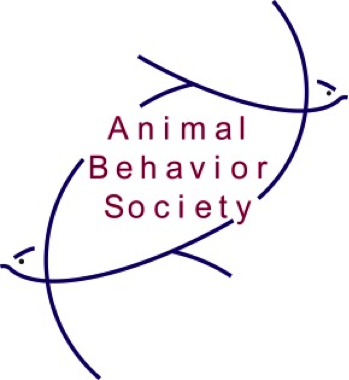John Alcock
IN A DESERT GARDEN: THE LIFE AND PASSING OF JOHN ALCOCK
By Ronald L. Rutowski, Arizona State University

On 15 January 2023 the field of animal behavior and behavioral ecology lost one of its champions with the passing of John Alcock. Through his prolific writings for scientific and popular audiences and his teaching, John drew his readers and students into the field through infectious enthusiasm and passion for animal behavior, natural history, natural selection, adaptationist hypotheses, and field work that were the hallmarks of his career.
John’s passion for nature started at an early age in Pennsylvania as a deep love of birdwatching, a love that persisted throughout his life although his interests later expanded to include the natural history of all things. As an undergraduate at Amherst College, he was mentored by the eminent chemical ecologist and Monarch biologist, Lincoln Brower. A formative experience at that time was a field trip to Trinidad with Brower who coached John on how to design rigorous experimental work on bird feeding. John went on to graduate school at Harvard University where his Ph.D. advisor was Ernst Mayr, a leading evolutionary biologist of the time. John’s commitment to the power of evolutionary concepts, especially that of natural selection and adaptation, grew out of his interactions with Mayr. His doctoral dissertation research was on learning in birds.
Upon graduating from Harvard in 1969, John immediately took a faculty position in the Department of Psychology at the University of Washington. There he was invited to join a field trip with Robert Lockard to the Chiricahua Mountains in Arizona. This trip was formative, and during it John discovered his intense love of the Sonoran Desert and its denizens. This led to two major changes in John’s career trajectory. One was his move in 1972 to join the faculty at Arizona State University where he remained even after retirement in 2008. The other was a shift in the focus of his research program from birds to insects.
At ASU, John was fully committed to both teaching and research. Early on he wrote his widely used and engaging textbook, Animal Behavior: An Evolutionary Approach. This book featured an approach that was a hallmark of virtually every book he wrote, that is, an enthusiastic use of testing of hypotheses for the adaptive function of traits to unravel the complexity and hidden secrets of the natural world, especially the behavior of animals. His textbook and lectures walked students through scientific analyses of behavior in a way that was understandable, empowering, and exciting. His skills and excellence in teaching were recognized through awards from ASU’s College of Liberal Arts and Sciences (1974) and the Animal Behavior Society (2007). John regularly revised his textbook ultimately producing an astounding 10 editions, the last printed in 2013 before he enlisted Dustin Rubenstein as a coauthor for the 11th (2018), the last edition that John coauthored. Thus, his writing drew students into the field and shaped their thinking about the process of science and animal behavior for over 40 years.
John’s textbook was also notable for promoting the application of an adaptationist approach to understanding the behavior of humans as well as non-human animals. This perspective on human behavior has been controversial since the publication of E. O. Wilson’s Sociobiology in 1975. It was a perspective that John, in the face of ardent criticism, wholly embraced and defended in a variety of his writings. The Triumph of Sociobiology (2001) is John’s compelling, clear, and full-throated defense of human evolutionary psychology.
Research was also a passion for John at ASU. He wholly embraced insects as tractable study organisms with a special focus on their mating systems. He recurrently worked on several taxa especially burrowing bees both in the US and Australia, tarantula hawks, and damselflies, producing detailed and insightful studies of the strategies, such as hilltopping, used by males to maximize their chance of encounters with receptive females. All told, his efforts yielded over 200 peer-reviewed publications and his widely cited book with Randy Thornhill, The Evolution of Insect Mating Systems (1983).
John was also very active in presenting natural history to a broader audience. In addition to 57 articles in the popular press, he wrote eight books on topics ranging from gardening and insects in the desert to orchids. One of those books, In a Desert Garden: Life and Death Among the Insects, received the John Burroughs Medal as the best natural history book of 1998.
This is not the only accolade John received that recognized his contributions to the fields of animal behavior and natural history. The US-based Animal Behavior Society elected him a Fellow in 1990 and he received their Exemplar Award (1996) and the 2007 teaching award mentioned earlier. In Britain, the Association for the Study of Animal Behavior presented him with their ASAB Medal recognizing his contributions to the science of animal behavior. At ASU, he was honored in 1988 with a Regents Professorship. He was in the first group of faculty to receive this honor. Clearly, John was a significant contributor to the development of the field of animal behavior and behavioral ecology for the last 50 years.
A picture of John and his life would not be complete without a few words about his personality that were well known to his friends. First, John was a staunch, if not obstinate, liberal. He regularly expressed his liberal views in no uncertain terms to those around him, to his elected representatives through letters and phone calls, and through regular contributions to liberal causes, especially those focused on the environment and conservation. His book, The Masked Bobwhite Rides Again, is perhaps his clearest statement of his environmental ethic. Second, John was a creature of habit. This is illustrated best by his multiple repeated visits to favored field sites in the Sonoran Desert such as Usery Mountain where he worked for decades on hilltopping insects, and Carnarvan in Western Australia which he visited 18 times to study burrowing bees. While not the most adventuresome lifestyle, it gave him a long-term perspective on his favorite haunts that is featured in some of his popular writings such as After the Wildfire: Ten Years of Recovery from the Willow Fire (2017). Third, John followed sports closely, especially the teams from Philadelphia near where he grew up and Phoenix-based teams. As a rule, he placed small bets with friends against these teams figuring that either outcome was a win for him. Lastly, the word game Boggle and ping pong were two of John’s very favorite leisure, albeit fiercely competitive, activities.
In 1968 John married Sue Coates and together they created a home on East Loyola Drive in Tempe where they hosted hundreds of memorable dinner parties with very lively discussions for local and visiting friends, colleagues, and family. They also raised two sons, John and Nick, who have become respected and accomplished practitioners in medicine and law, respectively.
For the last several years John dealt heroically with the physical and mental decline brought on by what was diagnosed in 2019 as Parkinson’s Disease but then later as Progressive Supranuclear Palsy. It was complications from this disease that ended his productive and rich life at the age of 80. He will be greatly missed by family, friends, and his profession.
The family asks that remembrances be in the form of donations made in John’s name to the Center for Biological Diversity or the Nature Conservancy of Arizona. Memorial service information may be found at JohnAlcock.com
